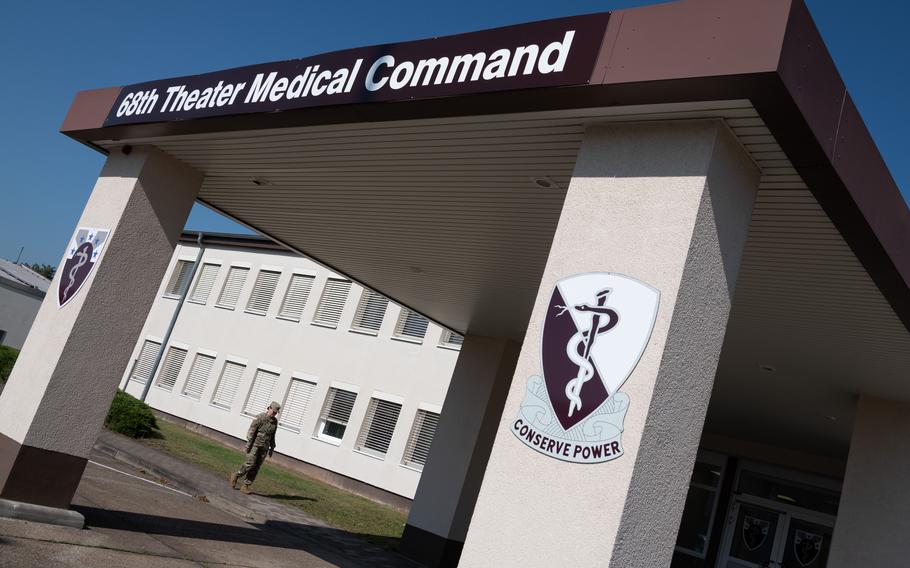
The 68th Theater Medical Command building on Sembach Kaserne, Germany, Sept. 20, 2024. (Phillip Walter Wellman/Stars and Stripes)
SEMBACH, Germany — A command that represents the largest change to the Army in Europe’s medical force structure in two decades took root Friday, military officials said as the service adapts to the lessons learned from Russia’s full-scale invasion of Ukraine.
The 68th Theater Medical Command, activated at a ceremony in southwestern Germany, will serve as a “one-stop shop” for everything medical on the Continent.
If a large-scale conflict were to break out, it would oversee the arrival of medical forces from the U.S., work with troops on the ground and coordinate with U.S. Army Europe and Africa to best use its resources.
In the meantime, it will perform similar functions during exercises and share medical intelligence, among other roles.
The war in Ukraine and the threat of spreading conflict added urgency to building up the unit, said Col. Tracy Michael, who assumed command Friday.
“We don’t want to be trying to figure this out after a crisis happens,” Michael said.
The Army approved plans for the 68th TMC’s establishment in 2017 after identifying a critical gap in medical command and control. The unit also coordinates medical activity in Africa and will work closely with other military branches and NATO allies.
Existing units don’t have the capacity to manage a wartime flow of people and equipment without compromising their health care services, officials said.
Deploying a U.S.-based reserve unit to fill a command-and-control role in a crisis is increasingly untenable, according to 68th TMC Command Sgt. Maj. Kyle Brunell.
“With the theater heating up, we can’t afford to wait days for a reserve unit to get here,” Brunell said ahead of Friday’s ceremony. “The command allows us to fill the gap much quicker.”
The unit’s advance team started up in September 2023 with a skeleton staff. Brunell was among the handful of troops who began the work, reporting to the unit’s first commander, Brig. Gen. Andrew Landers, who departed earlier this year.
On Friday, Lt. Gen. Sean Bernabe, deputy commander of U.S. Army Europe and Africa, passed the unit’s colors to Michael, moments after they were revealed for the first time.
The 68th TMC adds to the U.S. military’s burgeoning presence in Europe following Russia’s 2022 invasion of Ukraine. Since then, U.S. troop numbers on the Continent have swelled to about 100,000, the largest they’ve been since the Cold War.
Days before the ceremony, the 68th TMC participated in the Avenger Triad 24 exercise in Germany, which saw top U.S. Army commanders monitor in real time a scenario of all-out ground war with Russia as new NATO defense plans were put into operation for the first time.
“This exercise was not theoretical, it was not academic,” Bernabe told the crowd at Friday’s ceremony. “This exercise was tangible preparation for the challenges we may face together.”
The unit also impresses on adversaries that allied troops will fight hard, knowing they’ll be taken care of if they’re hurt, Michael said.
“An efficient and effective medical capability can be as effective a deterrent in this theater as missiles and tanks,” he said.
Katherine Kuzminski, a senior fellow and director of the Military, Veterans and Society Program at the Center for a New American Security, said one only has to look at current events to understand the new unit’s importance.
“The war in Ukraine serves as a sobering reminder that in near-peer modern war, nations can face rates of servicemembers wounded in action at levels approaching those of the world wars,” Kuzminski said. “This activation signals a commitment to mission success in a protracted conflict.”
The 68th TMC will not be replacing or assuming any units already in theater, including Medical Readiness Command — Europe, though it’s tasked to work with them closely.
Part of the reason it took a while for the activation ceremony to be held after the 68th TMC was set up was that the Army’s Institute of Heraldry had to agree on its colors and insignia, as it is a new unit.
Following Friday’s activation, the roughly 110 members of the 68th TMC were given new unit patches. The command is expected to have about 200 soldiers when it reaches full strength.
“We are serving at a consequential time, when our adversaries are emboldened and crisis and conflict loom heavy in our world,” Michael told the crowd Friday. “I look forward to the things that we’re going to accomplish.”